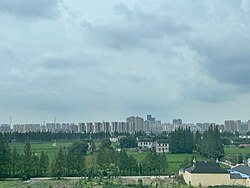|
Changshu
Changshu (Chinese: 常熟; pinyin: Chángshú; Wade–Giles: Ch'ang-shu'; lit. 'evergrow'; Suzhounese: /d͡ʐan¹³ ʐoʔ²³/)[2] is a county-level city under the jurisdiction of Suzhou, Jiangsu province, and is part of the Yangtze River Delta.[3] It borders the prefecture-level city of Nantong to the northeast across the Yangtze River. Due to the mild climate and terrain there, it has enjoyed a high level of agricultural civilization since ancient times, and is named after this, for the first character of its name (常) means "always, often", while the second (熟) means "ripe". The name of the adjacent county-level city of Taicang means "great granary". HistoryChangshu first became an independent county in 540 AD, but in 581 was made subordinate to Suzhou. It was promoted to seat of a full prefecture in 1295, was rebuilt and fortified in the 14th century, but in 1370 was reduced again to the level of a county. In the 15th and 16th centuries Changshu was several times attacked by Japanese pirates. Changshu has traditionally been a market town for locally produced rice, corn, wheat, tea, and mulberry leaves, and since the 13th century has been a major cotton-producing district. Although administratively still a subordinate city to Suzhou, it is a provincial base of foreign trade. Currently a harbour is being developed on the Yangtze River near Changshu to service Suzhou and Wuxi. EconomyThe city's major industries include textiles, paper-making, fine chemicals, machinery, steel and forestry products. The city has more than 4,000 textile and apparel companies with combined annual sales of RMB50 billion. The paper-making industry has attracted more the US$15 billion of FDI. By the end of 2007, this industry exceeded 2.4 million tons.[4] More than 2,000 foreign enterprises have invested in Changshu including big names such as Sharp and Dunlop. Of the contracted investment at least one-third has come from Taiwan – more than 500 Taiwan enterprises have invested more than US$100 million in the city.[citation needed] UPM-Kymmene from Finland has been running a paper mill in the city since 1999 and now has an annual capacity of 200,000 tons of coated and 600,000 tons of uncoated fine paper.[citation needed] Administrative divisionsChangshu is divided into 2 subdistricts and 9 towns.[5] 2 Subdistricts9 Towns
Discontinued/Merged townsClimate
InfrastructureThe China National Highway 204 Yantai-Nantong-Changshu-Shanghai, Sujiahang Expressway and Suzhou-Jiaxing-Hangzhou all pass through Changshu. Changshu has one Yangtze River crossing, the Sutong Yangtze River Bridge, one of the longest cable-stayed bridges in the world.[8] Education facilitiesCollege and universities
High schools
TourismGardens and parks
Hills
Archaeological sites
ReligionLocal people generally believe in Buddhism, Taoism, Protestantism and Catholicism. Changshu Christian Church is a Protestant church in the city. Transportation
Notable people
See alsoReferences
External linksWikivoyage has a travel guide for Changshu.
|
||||||||||||||||||||||||||||||||||||||||||||||||||||||||||||||||||||||||||||||||||||||||||||||||||||||||||||||||||||||||||||||||||||||||||||||||||||||||||||||||||||||||||||||||||||||||||||||||||||||||||||||||||||||||||||||||||||||||||||||||||||||||||

